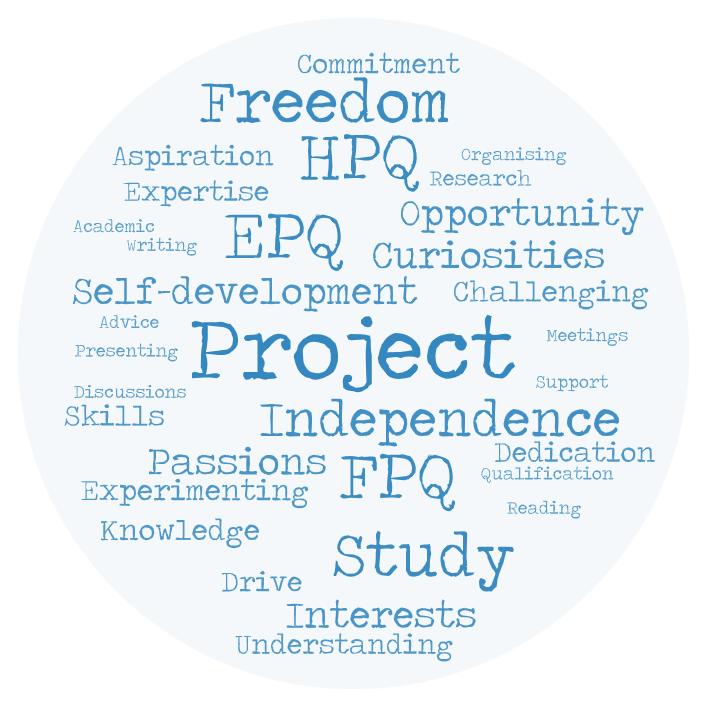The FPQ, HPQ & EPQ
Taught lessons (2024/2025)
Taught lessons take place weekly in room W2, starting in the week beginning 16 September 2024.
- Years 8 and 9 – Mondays
- Years 10 and 11 – Wednesdays
- Years 12 and 13 – Tuesdays
What are the FPQ, HPQ, and EPQ?
They are qualifications. The main thing you do is research.
Each takes about 9 to 12 months.
You research a topic that to choose. You can pick virtually anything.
(But you can’t do anything that overlaps too much with your GCSEs, A levels, or BTECs.)
You can also choose the type of project you want to do: an essay, a report, a performance (e.g. a drama), an event (e.g. a fashion show), an artefact (an artwork, a website, a song)…
There are taught lessons. These normally take place once per week, after school. Taking part in these is compulsory!
You are supported by a supervisor (a member of the teaching staff) who guides you through your project. You meet with them at different times during your project.
There is paperwork to fill in (the AQA ‘logbook’, or the OCR pupil progression record).
You must also keep a portfolio of evidence to show how you’ve done your project.
You give a presentation about your project on our annual presentation evening. You also answer any questions your audience has.
Who are they for?
About 550 project qualifications have been awarded to our students since we first introduced them at our school!
- Our EPQ, the most advanced version, is for (a) sixth formers and (b) students who have successfully done the HPQ.
- Our HPQ, the higher version, is aimed at students who have successfully done the FPQ.
- Our FPQ is the introductory version.


How do I decide on a topic?
Focus on your passions, interests, and curiosities. The University of Manchester has produced some useful PowerPoint presentation slides to help you choose, or refine, a possible topic.
How do I find a supervisor?
You need to ask your teachers (or teaching assistants)!
Like you, they volunteer to take part. So you will need to convince them!
They normally supervise a maximum of two students—unless they are very experienced in the role!
They don’t necessarily need to be an expert in your subject.
The most important thing is to find a teacher who you will feel comfortable working with over a year.
Why do a PQ?
The PQs can offer a big edge in university admissions. Many universities consider EPQs when making admissions decisions, and some even require them. A PQ can show universities that you are a motivated and independent learner, and that you have the skills and knowledge to succeed at university level.
They teach skills for university academic life. The skills you learn, such as research, writing, and critical thinking, are essential for success at university. Doing a PQ can help you develop these skills and prepare you for the challenges of university life.
They can help students discover future career paths. They can help you explore your interests and discover potential career paths. By researching a topic that you are passionate about, you can gain a deeper understanding of the subject and learn more about the different career options available to you.
They provide a productive break from regular GCSE, BTEC, and A level courses. The PQs can be a great way to take a break from your regular courses and focus on something that you are really interested in. It can also be a chance to explore a new subject or area of study.
They promote a genuine and potentially life long love of learning. The PQs can help you develop a love of learning that will last a lifetime. By choosing a topic that you are passionate about and conducting your own research, you can gain a deeper understanding of the subject and develop a lifelong interest in learning.
They can help you improve your grades. The PQs can help you improve your grades in other subjects. By developing the skills of research, writing, and critical thinking, you can become a more effective learner in all of your subjects.
They can help you develop your creativity. The PQs can help you develop your creativity by giving you the opportunity to explore a topic in your own way. You can use different methods of research, such as interviews, surveys, and experiments, and you can present your findings in a variety of creative formats, such as essays, presentations, or films.
They can help you gain confidence. The PQs can help you gain confidence by giving you the opportunity to demonstrate your skills and knowledge. By completing a PQ, you can show yourself and others that you are capable of independent research and critical thinking.
It can be fun! The PQs can be a lot of fun! By choosing a topic that you are interested in, you can make the process of researching and writing your PQ enjoyable.
How to apply
Applications for 2024/2025 year are now open!
To apply, you must email me.
In the header, write ‘PQ Application 2024/2025’. You can attach the letter to the email if you wish.
- Include your name and year group
- Give your first idea(s) for your project. (You can change this later!)
- Explain why you are well suited to doing a project. Discuss your experience, school record, and personal qualities
- Find a member of teaching staff who will be your supervisor, and name them.
- Ask your supervisor to write a short reference about you. They should email this to you. Include it in your application.
Deadline: Monday 16 September 2024 3 pm
Further details of taught lessons will also be provided.

The EPQ gives A level students excellent preparation for university-level study and may help boost their UCAS application.
University of Manchester
The University is also supportive of students undertaking HPQs.

Project qualifications such as the EPQ offer an unparalleled introduction to the skills needed for students to thrive in higher education.
University of Southampton
The EPQ can improve your chances of getting an undergraduate place at university.
University of Bath

Working on an EPQ encourages students to develop research and academic skills relevant to undergraduate study.
University of Oxford

An EPQ encourages independent learning and helps prepare students for higher education.
University of Birmingham

We welcome the EPQ and would encourage applicants to undertake one as it will help to develop independent study and research skills valuable for higher education.
University of Cambridge

The EPQ allows students the opportunity to enjoy researching an area of particular interest and it may provide a useful topic for discussion during interviews.
UCL

The EPQ has the potential to develop many skills which may prove beneficial when studying at King’s.
King’s College London

Applicants presenting the EPQ are encouraged to discuss their research in their personal statement.
University of Warwick

We support these awards as a means of challenging students and encouraging an interdisciplinary approach to learning.
University of Edinburgh

We welcome applicants offering an EPQ…where applicants choose to offer the EPQ alongside A levels, we may make two alternative offers, one of which involves success in the EPQ.
University of Bristol

The EPQ provides the opportunity for you to develop important research and academic skills.
University of Leeds

We encourage students to complete an EPQ, as we value the development of skills in independent study and research that it can offer.
University of Sheffield

We welcome sixth form students who wish to use the resources of the University Library to help them with their studies.
Durham University

The University recognises that the EPQ will provide an applicant with the opportunity to develop research and academic skills.
University of Liverpool

The University values the EPQ and its role in preparing students for a successful higher education experience and would wish to recognise and encourage this extended piece of independent work undertaken by the learner.
University of Exeter

We welcome the use of the EPQ as a means of challenging students and encouraging an interdisciplinary approach to learning.
University of Glasgow

The EPQ will definitely give you a taste of the type of independent research-led study you will be faced with at university – and which often causes problems for students who have not experienced it before.
Queen Mary, University of London

We look to support applicants who are taking the EPQ by recognising an A in the EPQ to lower the entry requirements by a single grade.
University of Cardiff

